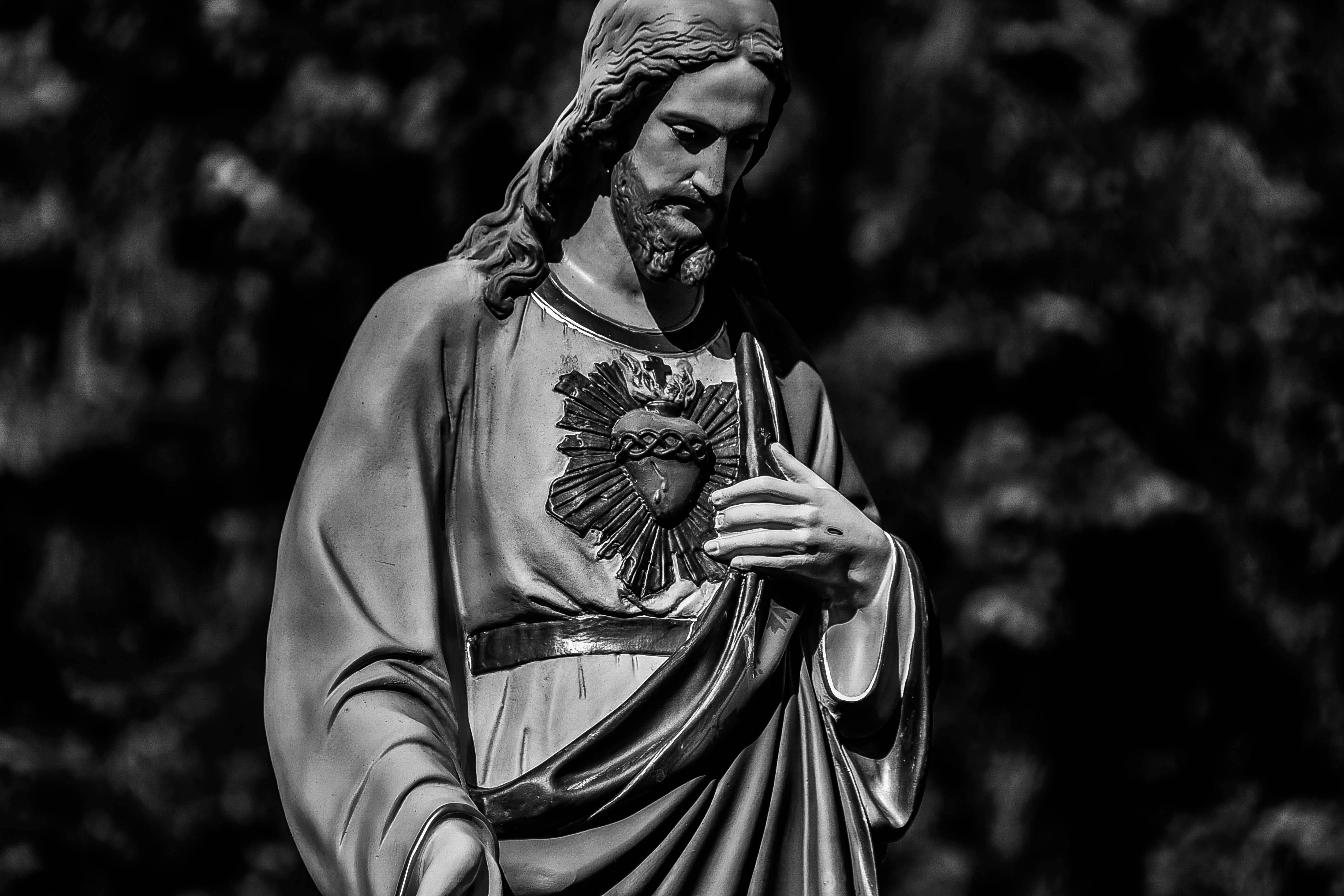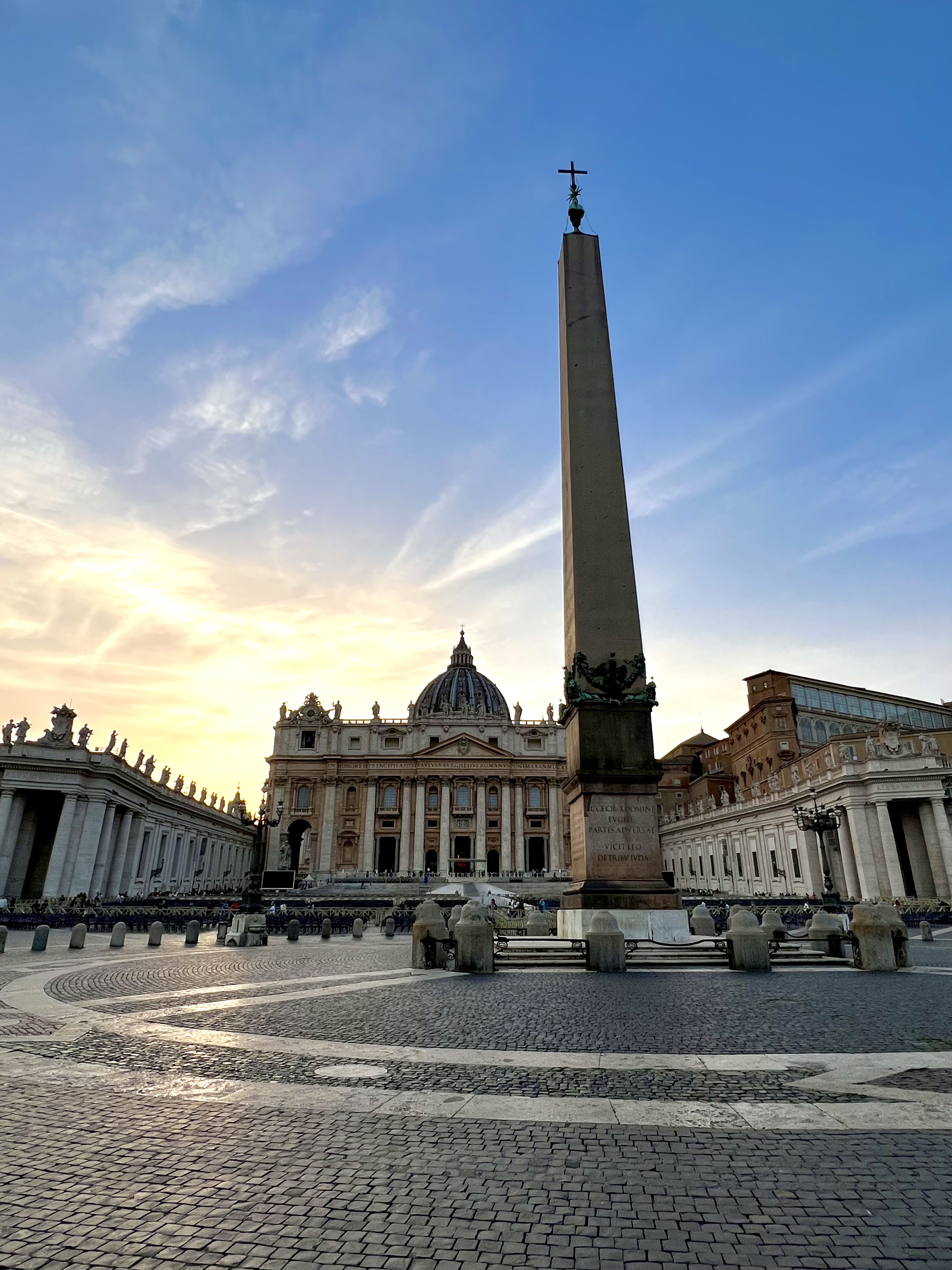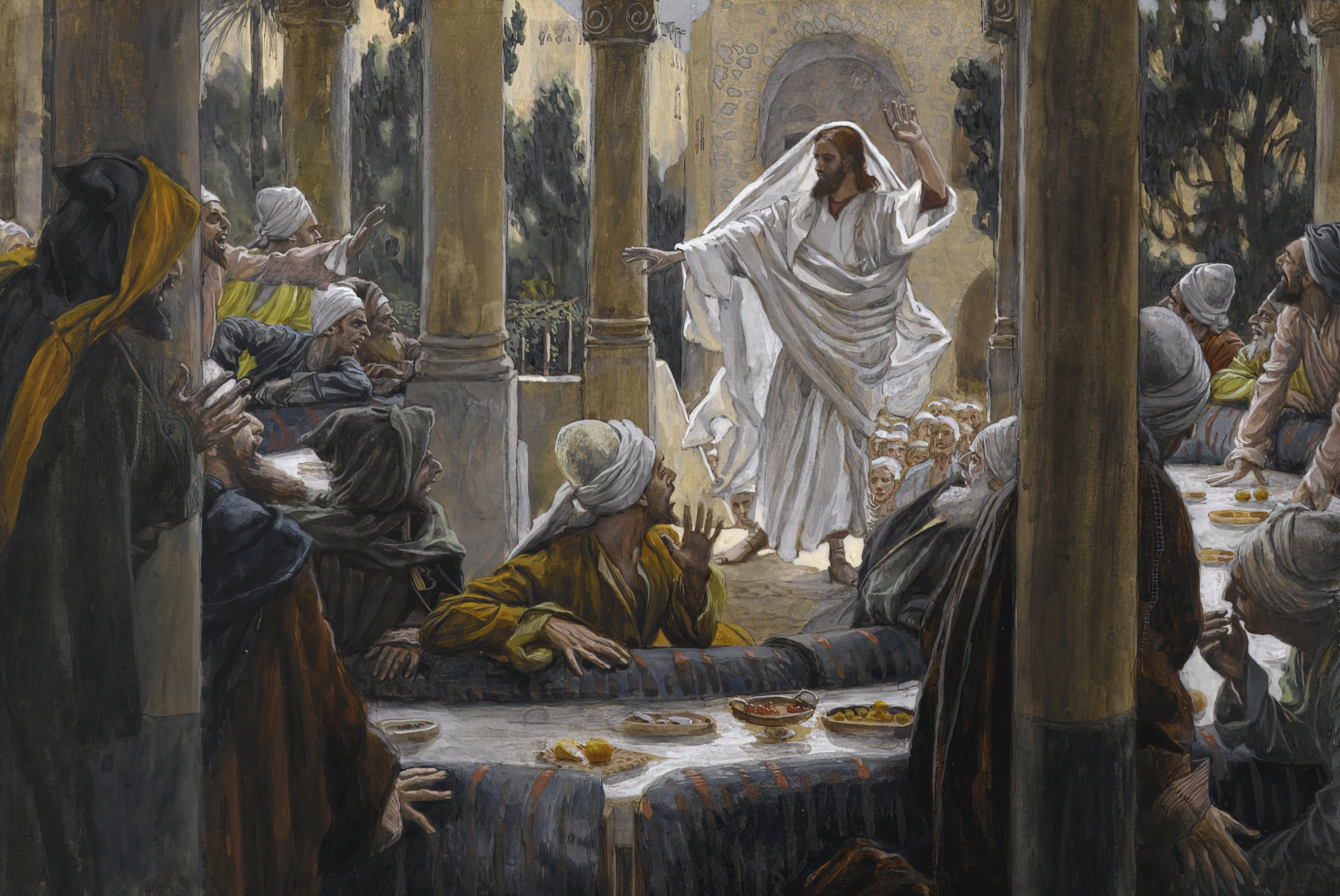Jesus, always the loving and gentle teacher, is being watched by the Pharisees. And He is watching them too. He sees them vying for the place of honor, in need of prestige and recognition. They are driven by their narrow vision to exalt themselves, rather than lift others up.
Jesus could easily call them out individually and embarrass them, putting them in their place. He is, after all, the King of the Universe. But he is also Incarnate Love. And so, rather than embarrass them, He tells a parable to the whole group gathered, and gives them the freedom and opportunity to take a good look at themselves and maybe even change their ways.
He knows the human heart better than anyone, and He understands the desire for self-promotion; it is part of fallen human nature to reach for what I refer to as the “5 P’s”: power, prestige, prosperity, popularity, pleasure. And He knows that we are made to be filled, not emptied; He knows that we cannot create a vacuum in ourselves by simply pushing away every desire. We must fill ourselves with good things, so there is no room for the bad.
He does not tell them that they should not desire honor; instead, he redirects their desire, elevating it. He points us heavenward, reminding us that any “honor” we receive on earth is meaningless if it does not result in heavenly reward. If we give something in order to be repaid, we are making ourselves the recipient of our own gift, which is no gift at all! When, on the other hand, we give something without desire for repayment of any kind, we “will be repaid at the resurrection of the righteous.”
When we try to exalt ourselves, we can never be exalted enough, and self-affirmation notoriously fails miserably. We cannot sincerely believe compliments or honor that we have manipulated others to give us. When we give to others without our own prestige and popularity as the goal, we are acting in true generosity. It is God alone Who sees these generous deeds, and God alone Who can repay them. When we acknowledge our littleness in the grand scheme of things and focus our energies on lifting others up, we act according to the humble Heart of Christ, and we are “blessed indeed.”
Jesús, siempre el maestro amoroso y gentil, está siendo observado por los fariseos. Y Él también los observa. Los ve compitiendo por el lugar de honor, necesitados de prestigio y reconocimiento. Su visión estrecha los impulsa a exaltarse a sí mismos, en lugar de enaltecer a los demás.
Jesús podría fácilmente reprenderlos individualmente y avergonzarlos, poniéndolos en su lugar. Él es, después de todo, el Rey del Universo. Pero también es el Amor Encarnado. Y así, en lugar de avergonzarlos, les cuenta una parábola a todo el grupo reunido y les da la libertad y la oportunidad de examinarse a sí mismos y tal vez incluso cambiar su comportamiento.
Él conoce el corazón humano mejor que nadie y comprende el deseo de autopromoción; es parte de la naturaleza humana caída buscar lo que yo llamo las “5 P”: poder, prestigio, prosperidad, popularidad y placer. Y sabe que estamos hechos para estar llenos, no vacíos; Él sabe que no podemos crear un vacío en nosotros mismos simplemente rechazando todo deseo. Debemos llenarnos de cosas buenas, para que no haya espacio para lo malo.
No les dice que no deben desear honor; al contrario, redirige su deseo, elevándolo. Nos señala hacia el cielo, recordándonos que cualquier “honor” que recibamos en la tierra carece de valor si no resulta en una recompensa celestial. Si damos algo para ser recompensados, nos estamos convirtiendo en receptores de nuestro propio regalo, así que ¡ni siquiera es un regalo! Cuando, por otro lado, damos algo sin desear ninguna recompensa, “ya se te pagará, cuando resuciten los justos”.
Cuando intentamos exaltarnos, nunca podemos ser exaltados lo suficiente, y la autoafirmación fracasa estrepitosamente. No podemos creer sinceramente en los elogios ni el honor que hemos manipulado a otros para que nos den. Cuando damos a otros sin nuestro propio prestigio y popularidad como objetivo, estamos actuando con verdadera generosidad. Solo Dios ve estas obras generosas, y solo Dios puede recompensarlas. Cuando reconocemos nuestra pequeñez en el gran panorama y centramos nuestras energías en ayudar a otros, actuamos conforme al humilde Corazón de Cristo y somos verdaderamente bendecidos.
 Kathryn Mulderink, MA, is married to Robert, Station Manager for Holy Family Radio. Together they have seven children (including Father Rob), and eleven grandchildren. She is President of the local community of Secular Discalced Carmelites and has published five books and many articles. Over the last 30 years, she has worked as a teacher, headmistress, catechist, Pastoral Associate, and DRE, and as a writer and voice talent for Catholic Radio. Currently, she serves the Church by writing and speaking, and by collaborating with various parishes and to lead others to encounter Christ and engage their faith. Her website is www.KathrynTherese.com
Kathryn Mulderink, MA, is married to Robert, Station Manager for Holy Family Radio. Together they have seven children (including Father Rob), and eleven grandchildren. She is President of the local community of Secular Discalced Carmelites and has published five books and many articles. Over the last 30 years, she has worked as a teacher, headmistress, catechist, Pastoral Associate, and DRE, and as a writer and voice talent for Catholic Radio. Currently, she serves the Church by writing and speaking, and by collaborating with various parishes and to lead others to encounter Christ and engage their faith. Her website is www.KathrynTherese.com
Feature Image Credit: Grzegorz Sękulski, pexels.com/photo/monochrome-photo-of-jesus-christ-statue-11606781/
The views and opinions expressed in the Inspiration Daily blog are solely those of the original authors and contributors. These views and opinions do not necessarily represent those of Diocesan, the Diocesan staff, or other contributors to this blog.


 Hailing from Nashville, Catherine is a graduate of Christendom College with a lifelong passion for words. Her love of writing and her Catholic Faith continue to shape her as a freelance editor, copywriter, and (aspiring) novelist, where she pursues her passions for the love and greater glory of God.
Hailing from Nashville, Catherine is a graduate of Christendom College with a lifelong passion for words. Her love of writing and her Catholic Faith continue to shape her as a freelance editor, copywriter, and (aspiring) novelist, where she pursues her passions for the love and greater glory of God.
 Tami Urcia is a midwestern gal from a large Catholic family. As a young adulthood she was a missionary in Mexico, where she studied theology and philosophy. After returning stateside bilingual, she gained a variety of work experience, traveled extensively and finished her Bachelor’s Degree at Brescia University. She loves organizing and simplifying things, watching her children play sports, deep conversations with close family and friends and finding unique ways to brighten others’ day with Christ’s love. She works full time at Diocesan in the Software Department and manages the Inspiration Daily reflections. She is also a contributing writer on
Tami Urcia is a midwestern gal from a large Catholic family. As a young adulthood she was a missionary in Mexico, where she studied theology and philosophy. After returning stateside bilingual, she gained a variety of work experience, traveled extensively and finished her Bachelor’s Degree at Brescia University. She loves organizing and simplifying things, watching her children play sports, deep conversations with close family and friends and finding unique ways to brighten others’ day with Christ’s love. She works full time at Diocesan in the Software Department and manages the Inspiration Daily reflections. She is also a contributing writer on 
 Elizabeth Tomlin is the author of Joyful Momentum: Building and Sustaining Vibrant Women’s Groups and contributing author to the Ave Prayer Book for Catholic Mothers. She is General Counsel for the Archdiocese for the Military Services, USA. Elizabeth is an Army wife and mother of three and currently lives in Oklahoma. You can find her at @elizabethannetomlin on social media and she blogs at
Elizabeth Tomlin is the author of Joyful Momentum: Building and Sustaining Vibrant Women’s Groups and contributing author to the Ave Prayer Book for Catholic Mothers. She is General Counsel for the Archdiocese for the Military Services, USA. Elizabeth is an Army wife and mother of three and currently lives in Oklahoma. You can find her at @elizabethannetomlin on social media and she blogs at 
 Felix Urcia was born in Lima, Peru. He moved the U.S. to complete his college degree in Computer Science at Northern Kentucky University. He is passionate about his faith, his family, education and soccer. When he is not homeschooling and caring for his young children he enjoys personal programing projects and sports analysis. He and wife live in a small town in Western Michigan where they enjoy spending time with their five children.
Felix Urcia was born in Lima, Peru. He moved the U.S. to complete his college degree in Computer Science at Northern Kentucky University. He is passionate about his faith, his family, education and soccer. When he is not homeschooling and caring for his young children he enjoys personal programing projects and sports analysis. He and wife live in a small town in Western Michigan where they enjoy spending time with their five children.
 Lily is a Michigan native and cradle Catholic who has spent most of her life exploring her own reasons to embrace her faith fully. She attended Franciscan University of Steubenville, where she discovered the beauty of her personal relationship with Christ and the Church. After college, she worked in Montessori Education for three years and recently transitioned to nannying. She was recently married and spends most of her time reading, and enjoying her dog and family!
Lily is a Michigan native and cradle Catholic who has spent most of her life exploring her own reasons to embrace her faith fully. She attended Franciscan University of Steubenville, where she discovered the beauty of her personal relationship with Christ and the Church. After college, she worked in Montessori Education for three years and recently transitioned to nannying. She was recently married and spends most of her time reading, and enjoying her dog and family!
 Pamela Kavanaugh is a grateful wife, mother, and grandmother who has dedicated her professional life to Catholic education. Though she has done her very best to teach her students well in the subjects of language and religion, she knows that she has learned more than she has taught. She lives, teaches, and writes in southwest suburban Chicago.
Pamela Kavanaugh is a grateful wife, mother, and grandmother who has dedicated her professional life to Catholic education. Though she has done her very best to teach her students well in the subjects of language and religion, she knows that she has learned more than she has taught. She lives, teaches, and writes in southwest suburban Chicago.


 Former NPS Park Ranger, Catholic educator, and Youth Minister, Melissa Lucca now spends her days evangelizing family and neighbors as a stay-at-home mom. She holds an MA in Theology from the Augustine Institute and pursues personal study in her spare time. Melissa loves Ignatian Spirituality, Mother Mary, and rock climbing. If you don’t hear her and her kiddo laughing at home, then they are probably out on an adventure!
Former NPS Park Ranger, Catholic educator, and Youth Minister, Melissa Lucca now spends her days evangelizing family and neighbors as a stay-at-home mom. She holds an MA in Theology from the Augustine Institute and pursues personal study in her spare time. Melissa loves Ignatian Spirituality, Mother Mary, and rock climbing. If you don’t hear her and her kiddo laughing at home, then they are probably out on an adventure!
